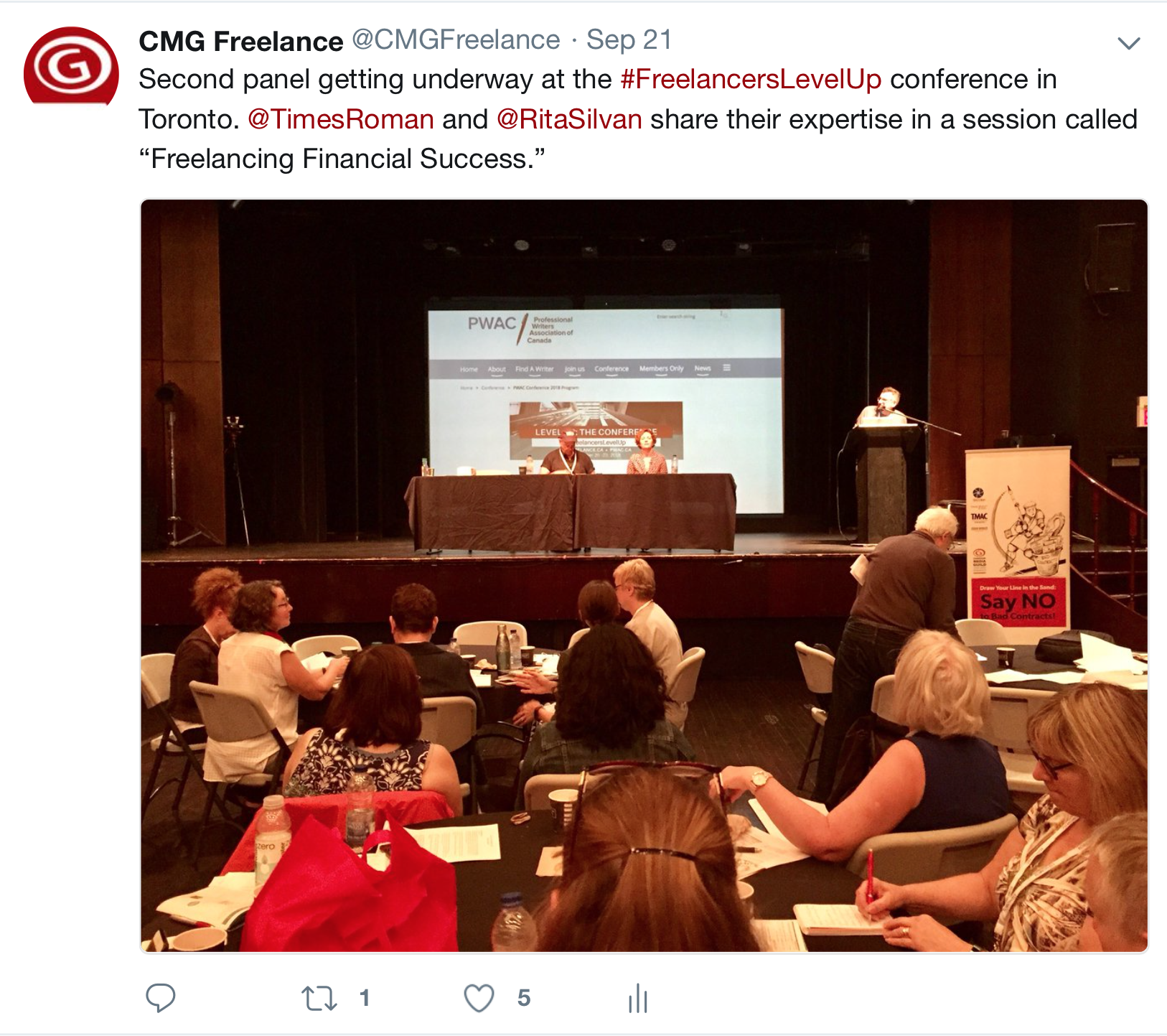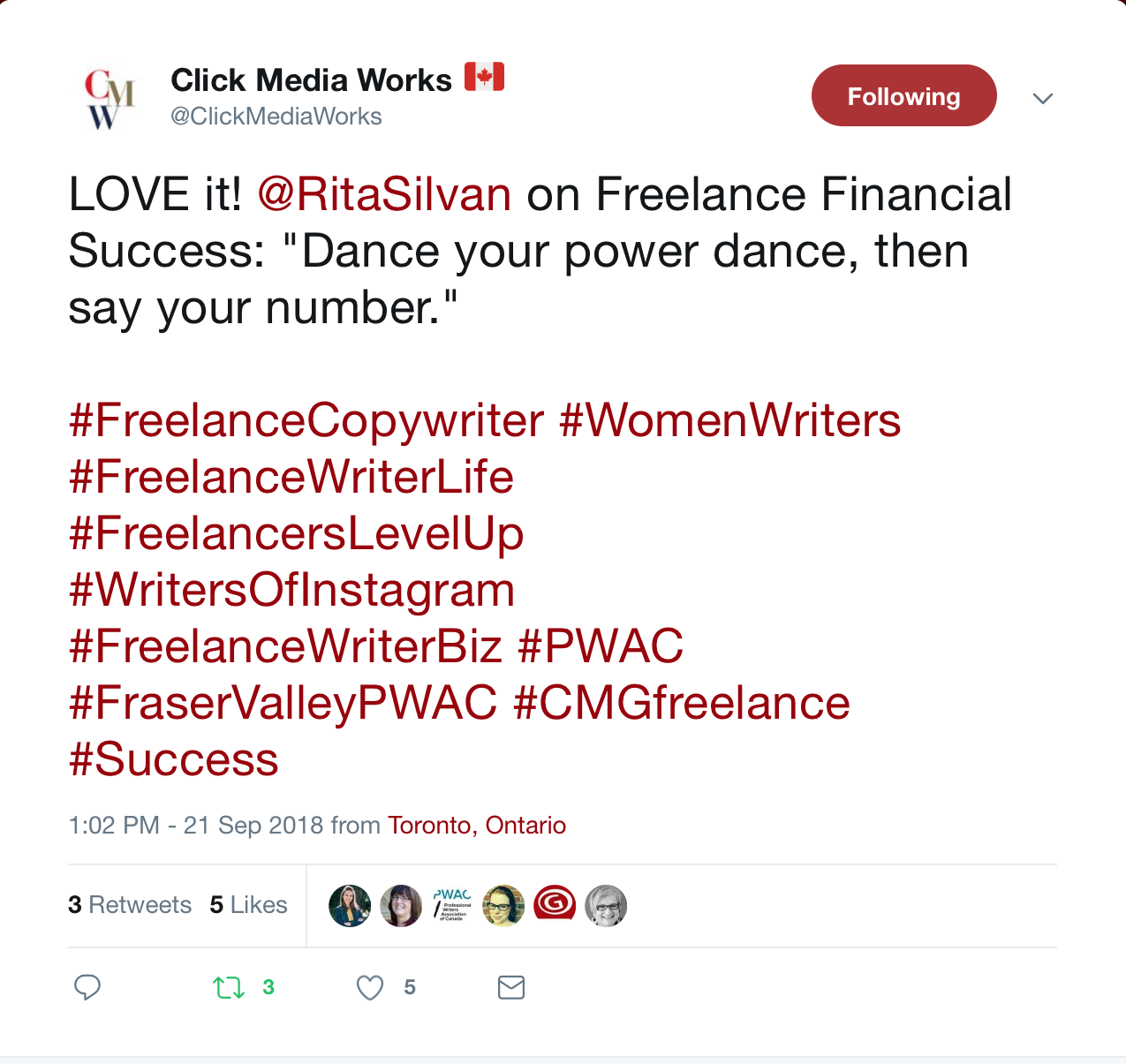Freelancing Financial Success: “Dance your power dance and then say your number”
 Follow your interests… and ask for more money.
Follow your interests… and ask for more money.
Those are the keys to financial success in freelancing, according to Toronto-based freelance journalist David Hayes and investment and lifestyle writer and editor Rita Silvan.
The two were part of a panel discussion called “Freelancing Financial Success” at the recent Level Up conference in Toronto. The session, co-presented by the Professional Writers Association of Canada and CMG Freelance, took place on September 21 at the Miles Nadal Jewish Community Centre.
Both Hayes and Silvan have had varied careers and shared what they’ve learned along the way.
Hayes said he decided early on that he only wanted to write for magazines and books and didn’t want to do any corporate writing.
To laughter from the audience, Silvan began her opening remarks with, “I’m the opposite, because I like money.”
Silvan said many of her career decisions have been financially motivated. The exception, she said, was the time she spent working in the consumer magazine industry. She was drawn to magazines because she’d always loved them. During the peak of her magazine career, she was the Editor-in-chief of Elle Canada.
Eventually, however, Silvan retrained in finances, which gave her the ability to freelance in corporate writing. In that world, she said, she experiences none of the “nonsense” of the magazine industry. As a corporate writer, Silvan said she’s respected as an equal partner with valuable skills.
Use those transferrable skills
Both panelists emphasized the value of writers’ transferrable skills.
Hayes teaches advanced feature writing at Ryerson, a role he first took on in 2003. Back then, he said, most of his students were interested in magazine journalism. But after the financial meltdown of 2008, magazines lost advertising revenue and enrolment in the course dropped off. Hayes switched the focus of the course, emphasizing the fact that feature-writing skills are fully transferrable to other, more lucrative types of writing. A writer’s storytelling skills, he said, can be used in corporate writing, as well as writing for foundations and non-profits.
In addition to Silvan’s freelance work, she is also editor of the website goldengirlfinance.com, a site that focuses on lifestyle with a finance angle. She said she’s a prime example of how writers can repurpose skills from the magazine world. Magazine writers can capture and engage a reader in ways that benefit brands and corporations. Banks, for example, struggled for a long time to engage their customers and make their educational and technical information accessible, particularly to women. Silvan said when she started out, she had no idea how just how big the market is for the kind of work she can do.
Most of all, said both panelists, be cognizant of the fact that you have valuable, marketable skills that people will pay for.
Follow your interests

Hayes and Silvan both recommended writing about subjects you’re passionate about. Hayes recommended harnessing your passions in ways that will help your freelance career flourish. If you see an opening and move into it even though you’re not interested in the subject matter, he said, you won’t be happy even if the pay is good.
Hayes compared charting your career course to paddling a canoe to a distant destination. He himself has deviated from his own planned route for interesting side-trips along the way, he said, but he always returns to his original course.
Silvan shared similar advice. At one point in her career, she said, she was writing three op-eds per week. She was making decent money, but she was suffering. She wasn’t really passionate about the work and was starting to feel like a gerbil on a wheel. It took so much of her energy, she said, that she was starting to lose her drive to work on other projects.
Find a balance, Silvan advised.
“Look after the work, but look after yourself as well.”
Money matters

Although freelancers hate to turn down work, Hayes said it’s important to learn when to say no. When an assignment doesn’t appeal to you, it might not be worth it, no matter how high the fee is. Turning down underpaid work, on the other hand, can establish you as a person who’s worth more and is in demand.
These days, Hayes mainly teaches and ghostwrites books. Ghostwriting, he said, has turned out to be considerably more lucrative than magazine writing. He’s built a reputation as a ghostwriter over the last dozen years. But even at the beginning of his ghostwriting career, he said, the projects he was offered paid better than magazine features.
Silvan spoke about the importance of “anchoring” your fee. “You say, I’m placing my price here,” she said, and it helps you keep your own value in mind. When she’s negotiating with a client, she said, that number becomes the anchor and she and her client start dancing around it, trying to reach an agreement.
“Dance your power dance and then say your number,” said Silvan.
Always ask about money, she advised, and always ask for the highest amount you’d like to get. In fact she recommended that freelancers ask for a price that feels uncomfortably high – you might be surprised at what clients will agree to pay.
Above all, she said, remember that you’re a professional. And you’re meeting your clients on equal ground.



